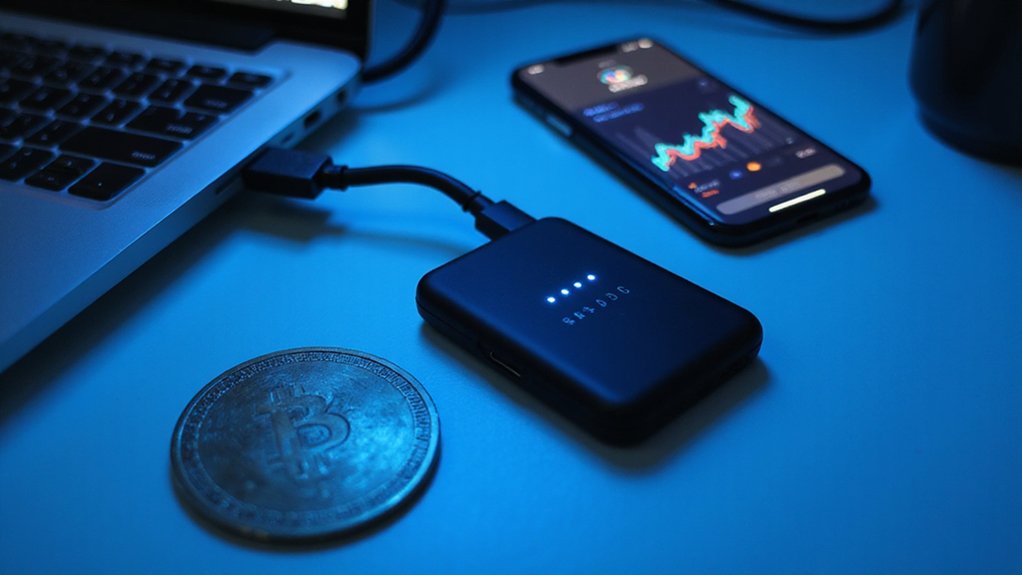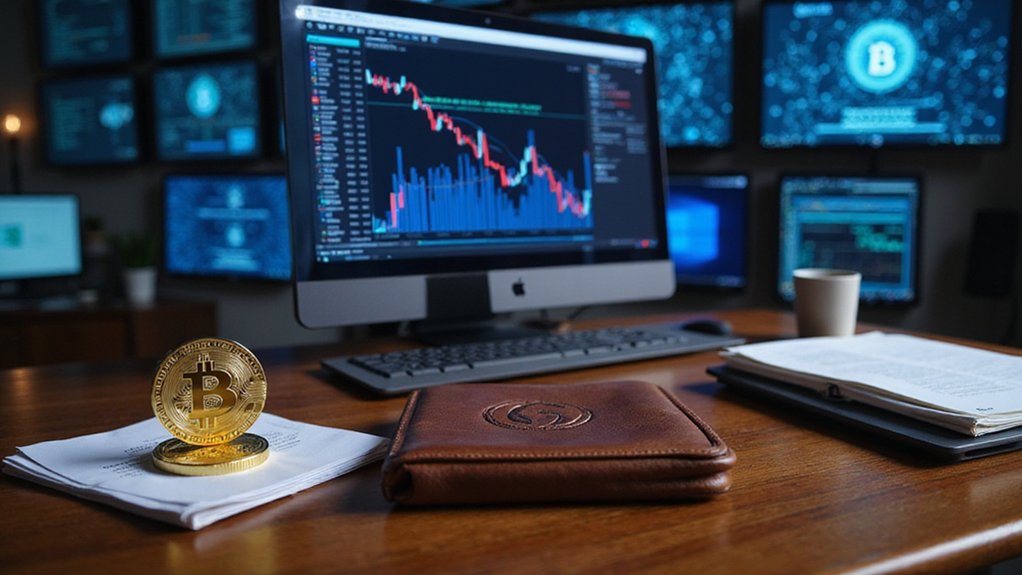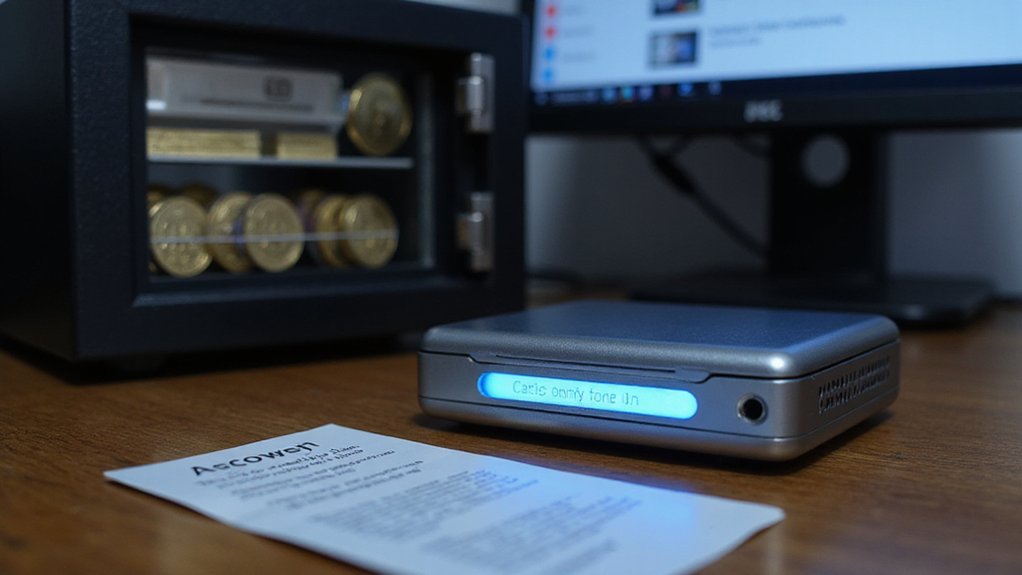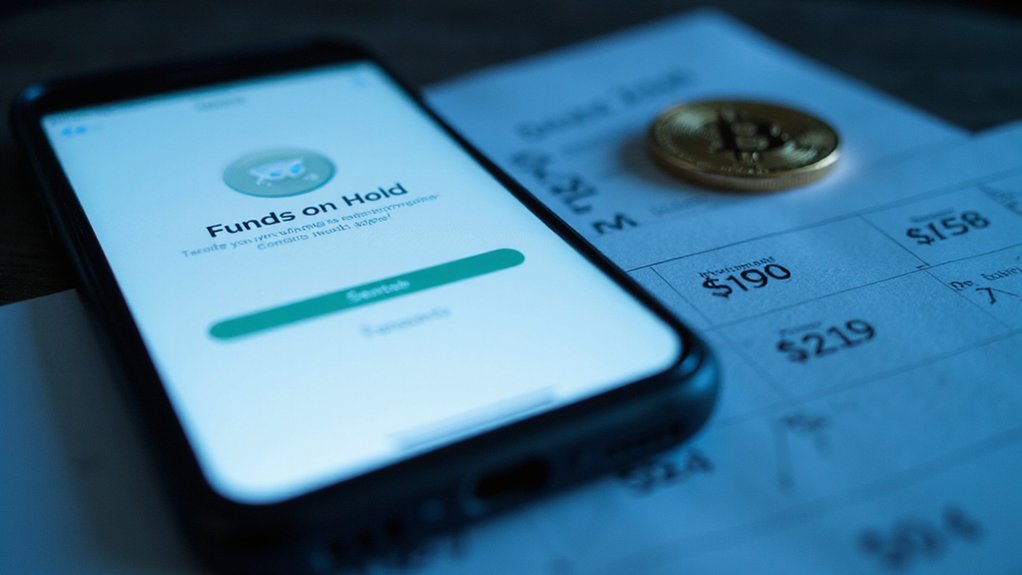Obtaining a Bitcoin wallet requires choosing between security and convenience—a financial Catch-22 that’s become remarkably mundane. Hot wallets (mobile, desktop, or web-based) offer accessibility but expose assets to digital predators, while cold storage options (hardware devices like BitBox02) provide fortress-level protection at the cost of usability. Download from official sources, generate private keys, and—perhaps most vitally—secure your seed phrase offline like it’s the nuclear launch codes. The wallet ecosystem awaits further exploration for those serious about their digital assets.
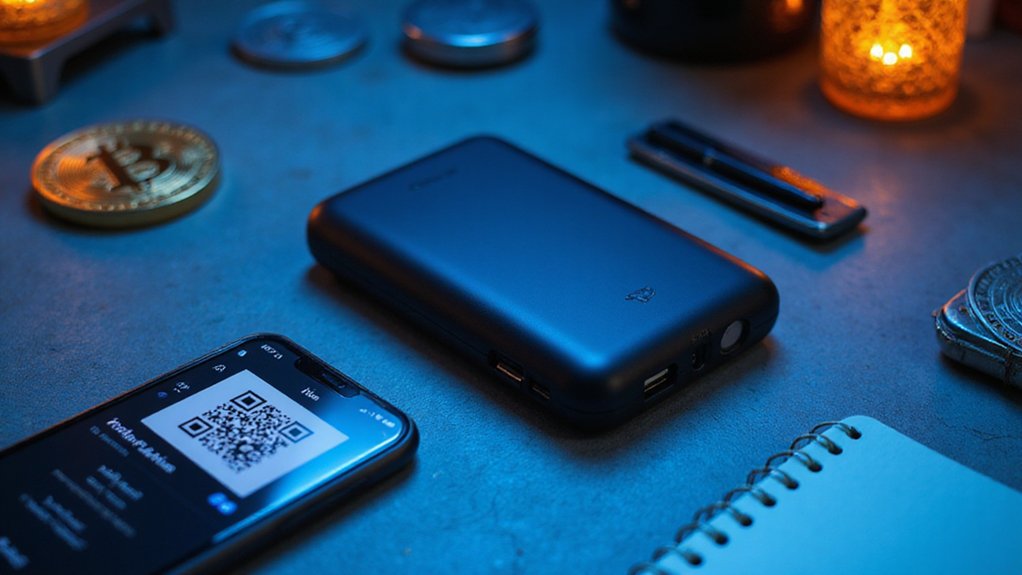
Why navigate the labyrinthine world of cryptocurrency without proper storage? Bitcoin wallets—the digital equivalent of a financial vault—serve as the foundational interface between users and the blockchain ecosystem, offering varying degrees of security and convenience predicated on one’s particular needs.
Bitcoin wallets bifurcate into two primary categories: hot wallets (connected to the internet) and cold wallets (offline storage solutions).
The cryptocurrency ecosystem presents a dichotomy of storage paradigms—connected versus disconnected—each balancing security against convenience according to one’s risk tolerance.
The former facilitates expeditious transactions but remains susceptible to malware infiltration, while the latter—though less convenient for quotidian use—provides substantially enhanced security against nefarious online actors.
This fundamental distinction invariably informs the selection process.
Users must evaluate their requirements concerning accessibility versus security.
Mobile wallets excel in facilitating face-to-face transactions via QR codes, whereas desktop variants afford complete control over funds and may support hardware integration.
Hardware wallets (BitBox02 being a notable exemplar¹) represent the gold standard for securing substantial crypto holdings, though they necessarily sacrifice some degree of convenience—a trade-off that seems rather trivial when considering the alternative of irrevocable asset loss.
These wallets act as cold storage devices when disconnected from the internet, providing maximum protection for your cryptocurrency assets.
Many security experts recommend using multi-signature wallets for an additional layer of protection when storing significant amounts of Bitcoin.
The setup process involves selecting a wallet compatible with one’s operating system, downloading from official sources (or purchasing hardware from reputable vendors), generating private keys, and—crucially—securing the seed phrase offline.
This seed phrase, a sequence of words functioning as the cryptographic resurrection mechanism, must be guarded with paranoid vigilance, as its compromise or loss renders one’s digital assets either vulnerable or permanently inaccessible.
Loss of access to these private keys typically results in permanent cryptocurrency loss, making secure management essential.
Features meriting consideration include custody arrangements (self vs. third-party), transaction validation capabilities, code transparency, privacy mechanisms, and fee structures.
Wallets like Exodus offer accessibility for neophytes, while Electrum caters to those with more sophisticated requirements.
The wallet ecosystem, much like the cryptocurrency space itself, presents a spectrum of options reflecting the inevitable tension between security and convenience—a paradox that, while frustrating, simply reflects the immutable reality of digital finance.
¹BitBox02 supports desktop and Android platforms but lacks iOS compatibility.
Frequently Asked Questions
Is Bitcoin Mining Still Profitable for Individual Users?
Bitcoin mining profitability for individuals has become virtually untenable in 2025.
The confluence of halved block rewards (now 3.125 BTC), skyrocketing network difficulty, and formidable hash rate competition has created an environment where solo miners face insurmountable economies of scale.
Unless one possesses access to extraordinarily cheap electricity (preferably below $0.05/kWh) and capital for state-of-the-art ASIC hardware, the venture typically yields negative returns.
Large-scale operations with industrial infrastructure remain the only viable participants in this increasingly centralized pursuit.
How Do I Report Bitcoin Transactions on My Taxes?
Reporting Bitcoin transactions requires documenting each disposal event (sales, exchanges, or purchases made with crypto) on Form 8949, detailing acquisition date, disposal date, cost basis, and proceeds.
These transactions then flow to Schedule D for capital gains reporting.
Mining rewards or payments received in Bitcoin? Those get reported as ordinary income on Schedule 1.
The IRS, increasingly adept at blockchain forensics, treats crypto as property—not currency—subjecting transactions to capital gains rules regardless of dollar amount.
Can Bitcoin Wallets Be Hacked or Compromised?
Bitcoin wallets, despite blockchain’s robustness, remain surprisingly vulnerable to compromise through various attack vectors.
While the cryptographic underpinnings resist direct assault, peripheral vulnerabilities abound: phishing schemes targeting private keys, malware injections in wallet software, SMS interception for two-factor authentication, and dependency exploits in open-source projects.
Cold storage solutions mitigate these risks, though even offline wallets aren’t impervious when seed phrases are improperly secured.
The irony? The greatest security threats often stem from human error rather than technical shortcomings.
What Happens to My Bitcoin if I Lose My Wallet Password?
Losing a Bitcoin wallet password is akin to misplacing the combination to an impenetrable vault—your coins remain precisely where they were, tantalizingly visible on the blockchain yet completely untouchable.
Without the cryptographic key that password accesses, those digital assets become permanent fixtures in Bitcoin’s ecosystem (statistically indistinguishable from Satoshi’s dormant fortune).
Recovery options exist—seed phrases being the predominant lifeline—but without such backups, one’s holdings transform into cautionary tales rather than liquid assets.
How Volatile Is Bitcoin Compared to Traditional Currency?
Bitcoin exhibits substantially higher volatility than traditional currencies—often 4-5 times that of major fiat currencies.
While traditional currencies fluctuate within narrow bands (typically 0.5-1% daily), Bitcoin can swing 5-10% in 24 hours without raising eyebrows.
This volatility stems from Bitcoin’s relatively nascent market structure, limited liquidity, regulatory uncertainty, and sentiment-driven trading patterns.
The trade-off? Bitcoin’s Sortino ratio of 1.86 suggests this volatility has historically skewed toward positive returns rather than downside risk.
